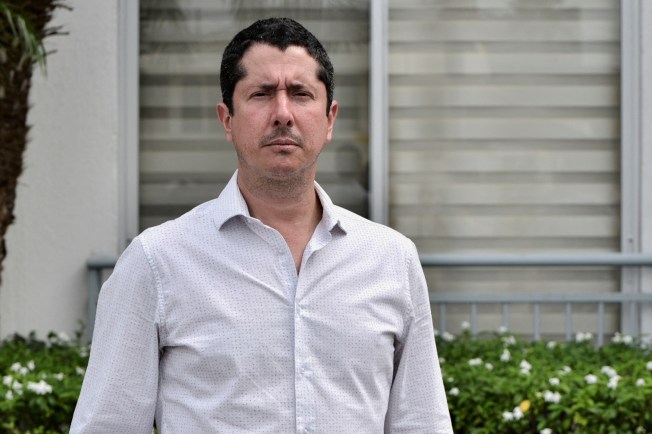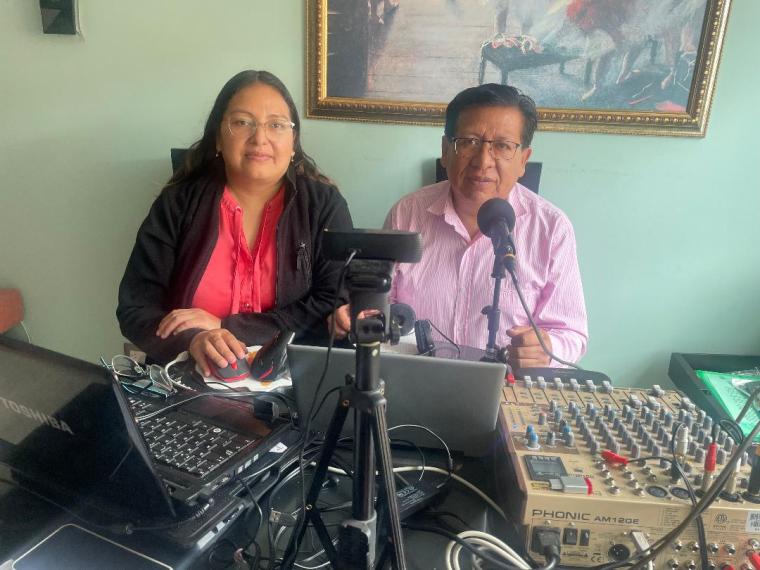On the only radio station in the remote Ecuadorian town of Baeza, morning show host Juan Carlos Tito updates listeners on the weather, recent power outages, and repairs to a bridge spanning a nearby river. For the last 24 years, Tito, 53, has been the trusted voice of Radio Selva, broadcasting important community news to this town of 2,000 in the Andean highlands.
But now, Tito’s voice is beamed into Baeza from abroad.
After investigating drug gangs in and around Baeza, he received several death threats last year. So, in October, he and his wife and show producer Elvira del Pilar Nole, and their two children jammed their suitcases into the back of a borrowed car and escaped from Baeza in the dead of night.
“We were absolutely sure that within the next 24 to 48 hours they were going to attack us,” Nole said. “So, we had to escape.”
Now, they transmit their two-hour morning program, “Buenos Días, América,” from the kitchen table of their cramped apartment in a smoggy, traffic-choked Latin American city which they declined to name out of fears for their safety. Explaining why she and Tito continue to broadcast from abroad, Nole, 42, says: “We are like an umbilical cord for Baeza because we are the only ones providing local news.”
Tito and Nole have joined a growing exodus of journalists from the South American nation. An outbreak of drug-related violence has led to a surge in threats against journalists, César Ricaurte, the director of Quito-based press freedom group Fundamedios, told CPJ. He said that 16 members of the press have fled Equador since 2023, according to Fundamedios records.
“It has become a regular occurrence due to the rise of organized crime,” Ricaurte said in a phone interview. “Any reporting that that these groups think will hurt their businesses leads to threats and attacks on journalists.”
Ecuadorian journalists are not the only ones on the run. Across the world, journalists are fleeing direct threats, war, and repressive regimes. Between 2020 and 2023, CPJ’s support to exiled journalists jumped by 227%, with journalists from Afghanistan, Iran, and Nicaragua making up the largest shares of exiled media members to receive help.
“When a journalist is forced into exile, journalism suffers,” wrote CPJ Emergencies Director Lucy Westcott last year. “Many journalists cease reporting when they relocate, and readers, viewers, and listeners are robbed of the information they need to make informed decisions about their lives.”
One recent prominent Ecuadorian journalist to pack his bags is José Luis Calderón, a reporter and on-air host for TC Televisión who was held hostage by masked gunmen when they briefly occupied the public TV station in Guayaquil on January 9. During a live newscast, viewers watched as Calderón, 48, tried to reason with the intruders who pointed guns at the journalist, placed a stick of dynamite in his jacket pocket, and threatened to kill his colleagues if police intervened.
“I was trying to calm down the gunmen because we were all in danger,” Calderón told CPJ in a phone interview. “My coworkers were pleading for their lives.”

Eventually, police arrested the gunmen, but the episode had a devastating impact on Calderón. He told CPJ that he became anxious and paranoid, sought psychiatric help, and was diagnosed with post-traumatic stress disorder. Maintaining that TC Televisión could not guarantee his safety, he quit his job and in April left Ecuador for the United States, where he is seeking political asylum.
“I had to leave because I was in really bad shape,” Calderón said. “My mental health was at stake.”
A CPJ special report published last year found that political turmoil combined with rising organized crime in Ecuador have put journalists at much greater risk, leading to self-censorship among reporters working in high-risk areas, and prompting some to leave the country.
Over the past decade, the country’s drug-trafficking gangs have become increasingly violent while turning Ecuador into a major transit point for cocaine from neighboring Colombia, according to Insight Crime. Between 2019 and 2023, the homicide rate increased by more than 500 percent, according to the independent Ecuadorian Observatory on Organized Crime.
Following the armed takeover of TC Televisión in January, President Daniel Noboa, who was elected last year on a law-and-order platform, declared a state of “internal armed conflict” against 22 criminal gangs. Since then, overall killings have decreased but extortions and kidnappings have risen and “the security situation remains dire,” according to Human Rights Watch.
Ecuador’s two main gangs, known as Los Choneros and Los Lobos, control many of the country’s prisons and work in concert with Colombian and Mexican cartels as well as corrupt Ecuadorian officials. Ecuadorian prosecutors say that members of Los Lobos planned last year’s assassination of presidential candidate and former journalist Fernando Villavicencio, who had vowed to crack down on gangs.
Journalists reporting on gangs are usually the ones who get threatened, says Karol Noroña, who used to write for the Ecuadorian news site GK. Her troubles began when she began investigating how gang leaders control penitentiaries and run illicit businesses from behind bars. After one of her sources told her that a gang leader was threatening to kill her, Noroña fled Ecuador in April 2022.
“The gangs realized I was not on their side,” Noroña told CPJ in a phone interview. “That’s why I had to go into exile.”
She has split her time between Bogotá and Buenos Aires but says life in exile is sad, depressing, and expensive.
“The hardest part is getting uprooted,” she said. “I never wanted to leave the country. Not being able to work took away the most important thing in my life.”

Noroña and other Ecuadorian journalists who have gone into exile told CPJ they’ve received some help from independent groups, like Fundamedios. (CPJ has also provided journalists assistance grants to reporters from Ecuador.) But these journalists complain that government officials in Ecuador have shown zero interest in their plight.
Last year, Ecuador’s government created a “protection mechanism” made up of government officials, civilians, and independent media workers to support at-risk journalists. But Ricardo Rivas, president of the mechanism, told CPJ that the government has so far refused to provide it with any money despite a budget request for about $66,000 to protect media workers.
“The government talks about the importance of freedom of expression and respect for the press, but in practice it’s not interested,” said Rivas, whose brother, photographer Paúl Rivas, was kidnapped and killed by Colombian guerrillas in 2018.
Carlos Lauría, author of the CPJ special report on Ecuador and currently executive director of the Inter-American Press Association, said it’s imperative for Ecuador’s government to fund the protection mechanism. In a phone interview with CPJ, he added that the forced exodus of so many journalists — as well as self-censorship by those who remain in the country — had badly damaged press freedom in Ecuador.
“This is a huge blow for Ecuadorians who need access to vital information in order to debate the country’s problems and make informed decisions,” Lauría told CPJ.
Irene Vélez, the government’s secretary of communications, did not respond to CPJ’s text messages seeking comment.
The longer journalists remain in exile, the harder it can be for them to remain in the profession, says Ricaurte of Fundamedios. Calderón, for example, is living in Miami, unemployed, and wondering if he’ll ever again find work as a journalist.
“I feel more at peace living in the U.S.,” he says. “But now I have to start my career over, from scratch.”
For Tito and Nole, the husband-and-wife team running Radio Selva from exile, the station keeps them linked to Ecuador and doing the work they love. That’s why from Monday through Friday, they rise at dawn to gather information via phone interviews, chat groups, and social media to keep their morning news show alive.
One subject they no longer cover is drug trafficking. Indeed, their problems began two years ago when Tito, at the urging of local residents whose children were becoming addicting to cocaine, began investigating who was selling drugs in and around Baeza.
Soon after, burglars broke into Tito and Nole’s house in Baeza and stole their laptops and cell phones. A lawyer who defends gang members warned that they should leave Baeza. To emphasize the point, a man on a motorcycle threatened Tito.
“He lifted up his shirt and showed me his gun,” Tito said. “He called me a ‘toad’ [a police informer] and said: ‘If you keep publishing this stuff, you will see what will happen.’”
When the family, which includes two daughters ages 13 and 8, decided to flee, they initially moved to another town in Ecuador last October. But when the menacing phone calls didn’t stop, they left the country in January.
Few people know their whereabouts. Indeed, Baeza residents and town officials are sometimes puzzled when Tito and Nole insist on telephone rather than in-person interviews for their radio program. But they prefer to be discreet about their location. Should people in Baeza find out that the journalists were forced out, they may feel too afraid to speak with them, Nole says.
It’s unclear how long the family can keep up the charade. They will have to return to Ecuador by the end of the year if they want to renew their government license to operate Radio Selva. It’s also difficult to drum up advertising when they can’t go door-to-door to win over prospective clients.
But Tito and Nole acknowledge that it’s unlikely security will improve in Ecuador anytime soon or that the drug gangs in and around Baeza will go away. Meanwhile, the journalists have applied for political asylum in the country where they are staying and are mulling proposals from the U.N. refugee agency to relocate to a country even farther away from Ecuador.
However, such a move would mean unplugging Radio Selva for good. And if that happens, Nole said, “it means that the bad guys win.”
